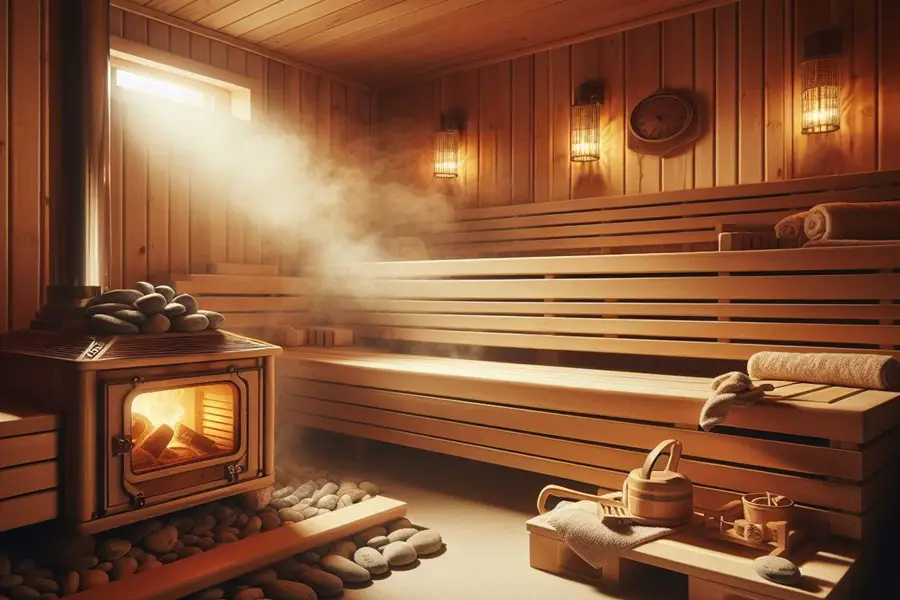When picking cedar alternatives for saunas, you should consider some characteristics. The wood should resist decay and have good thermal insulation but still remain cool to the touch.
It also should have minimal knots and a low tendency to splinter. Other factors you could consider are wood appearance and aroma.
Continue reading this article to learn about alternatives to cedar for sauna structures and find out the cheapest wood option you can use.
Alternatives to Cedar for Sauna
Here are six alternatives to cedar that have some of the previously mentioned desirable traits:
Abachi Wood
Abachi wood (also known as obeche) is an African hardwood that’s soft, light, and low in hardness. Although this African timber isn’t durable, it can resist rot once dried properly.
Plus, it has decent strength properties. Sure, it’s not as strong as cedar, but for building saunas—especially interior benches—it’ll get the job done.
What’s favorable about this wood type is that it doesn’t chip or splinter. That’s a desirable feature since sauna users are usually saintly clothed and can get injured from wood chips.
Just keep in mind that obeche is creamy to pale yellow with minimal knots. So, the timbers might be a bit bland looking.
Still, because it’s low in hardness, obeche timber is easy to work with. As a result, you can get a clean finish with this type of wood.
Common Aspen Wood
Another common hardwood choice for sauna benches and walls is the common aspen. This tree grows in cool temperate zones in Europe and Asia and belongs to the poplar tree family.
Poor conductance of heat and low moisture content make aspens a common choice for saunas.
Among the other desirable characteristics of the common aspen is that it’s resin-free. Why? That’s because at high temperatures, around 212ºF, the resin can melt and leak out of the wood.
Not only is the sticky substance undesirable to touch, but the escaping liquid can affect the timber’s strength. As a result, it risks weakening the sauna’s structure.
Although aspens are generally easy to work with, their fuzzy surfaces need fine sanding to reduce the grainy texture. Plus, they’re susceptible to insects and mold.
Like obeche, aspen wood is light, low in knots, and lacks a distinctive pattern.
Basswood
Basswood, or Linden, is one of the popular choices for saunas, thanks to its therapeutic properties.
Generally, basswood is non-toxic and low in allergenicity, making it ideal for people with sensitive skin. Linden trees can also provide sedative properties as well as other health benefits.
Unlike cedar, American basswood has little to no fragrance. That makes it a good choice if you’re not a fan of strong scents.
This healing tree ranges from pale white to light brown. Plus, it rarely contains knots.
Thanks to its lightness and softness, basswood is easy to shape. However, it isn’t durable, as mold can decay the heartwood.
The biggest advantage of Linden is its affordable price since it’s widely available.
Redwood
Redwood is the closest wood option to cedar. Interestingly, redwood is a softwood, yet it’s more durable than all the hardwood choices mentioned in this list.
It can resist rot, especially in older trees. Similar to cedar, redwood is low in density, so it doesn’t hold on to heat, making it an excellent choice for sauna benches and inner walls.
What’s more, the timber is visually appealing, with a heartwood color ranging from pinkish brown to dark reddish brown. It can also contain a few knots, depending on the timbre grade.
Like many sauna wood varieties, this colorful wood doesn’t produce resin. It’s also easy to work with and holds nails well.
However, it may splinter if the cutting tools aren’t sharp enough.
On the downside, redwood’s color fades over time and turns gray, especially in damp climates.
Western Hemlock Wood
Hemlock is another softwood that serves as a cheaper alternative to cedar. Although it’s not as durable as cedar, it still has decent strength and is resin-free.
Depending on the quality, hemlock timbers can contain many knots, which will cause them to splinter when shaped. Plus, they have a straight-grain texture, a trait that makes the wood prone to chipping.
However, thanks to its uniform texture and warm, light reddish brown color, hemlock wood is a good choice if you want to build a contemporary-looking sauna. It has a distinct aroma, so it might suit those who wish for a fragrant sauna.
Heat-treated Wood
Whether it’s in indoor or outdoor saunas, thermally-treated wood is an excellent alternative to cedar. The heat treatment process involves exposing wood to a high temperature of 392ºF or higher in the absence of oxygen, thereby reducing moisture and organic material content.
As a result, the timber becomes lighter and more resistant to decay and insects. It also doesn’t absorb much water, reducing the risk of swelling.
On the flip side, thermally modified wood can lose some of its strength. Plus, the timber loses its natural color and becomes darker.
Is Spruce Good For Saunas?
Yes, spruce, especially Nordic spruce, is an affordable softwood option commonly used to build Finnish saunas. Spruce is light, has a fine-grain texture, and will give you that typical sauna smell.
It’s slightly resistant to mold, durable, high in density, and strong—all of which make it a great choice for sauna construction.
What Is the Cheapest Sauna Wood?
Pinewood is probably the cheapest option you can use to build saunas. This affordable wood boasts a pale white to yellow color similar to spruce.
Like spruce and hemlock, pine is a softwood that has a distinctive scent. However, it’s weaker and less durable than both. Plus, it contains resin and knots.
For an affordable sauna, you can use thermo-pine to build the frame, as it has better physical and chemical properties.
Final Takeaway
Cedar is a popular choice for saunas thanks to being both strong and pliable. Still, it’s on the expensive side and may not be available in your area.
In such situations, you might need to find alternatives to cedar for sauna construction. Luckily, plenty of hardwood or softwood can substitute for cedar, such as abachi, aspen, redwood, and western hemlock.
Each wood option has its pros and cons, and ultimately, picking the most suitable sauna wood is up to your preference and budget.
Husband and father of three (actually, four if you include the pool). I’m an avid DIY-er and weekend warrior that enjoys taking up new projects around the house to help us maximize leisure right at home. I enjoy researching and sharing various tips, tricks and knowledge to help others make their home an oasis.

